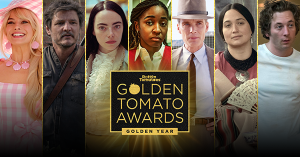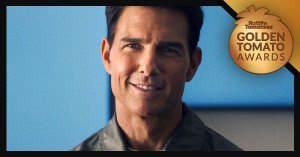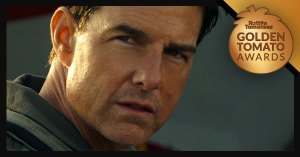Griffin Dunne’s Five Favorite Films
I wish I could say that my first introduction to Griffin Dunne in the 80’s was An American Werewolf in London so I seem like I was a really savvy moviegoer even as a kid, but it wasn’t. It was Who’s That Girl, where he co-stars alongside Madonna as Loudon Trott, a tax attorney who, thanks to her, who goes from “uptight squaresville” to “knock knock jokes on the back of a bus-ville.” Even though I was young, I could tell that they had to cast someone rock solid against The Material Girl to anchor all that bleach-blonde pizzaz, so I dug into his filmography and was delighted by the likes of After Hours and Johnny Dangerously, just to name a few. In decades following, my fandom increased as I noticed that Dunne delivers the same kind of solidity and confidence regardless of the film genre, year, or role. The same can be said for my latest fix directed by Justin Schwarz called The Discoverers, where Dunne plays a dad who drags his family on a Lewis and Clark re-enactment trip.
The following Five Favorite Films are specifically categorized as the handful that, if they are on television, will get Mr. Dunne to stop channel surfing and settle in, dinner plans be damned.
Scarlet Street (Fritz Lang, 1945; 100% Tomatometer)
This stars Edward G. Robinson, and is directed by Fritz Lang. Edward G. Robinson, of course, was always known as the tough guy, the gangster, the one you do not mess with, and Fritz Lang had the brilliance to sort of counter-cast him as a man having a mid-life crisis. He falls for a younger woman and just throws his life away, and it is so contemporary and so touching and tragic. It’s the kind of thing that I saw probably 30 years ago and couldn’t believe the bravery and vulnerability that Edward G. Robinson put himself through. I always thought of him as a guy holding a gat intimidating Humphrey Bogart. It’s the kind of thing as you get older, his character and the themes of the movie just have more and more resonance. It’s one of those movies that stills holds up because of what it’s about. It’s a timeless subject.
Ace in the Hole (Billy Wilder, 1951; 87% Tomatometer)
It’s sort of the first–and I think still the best–about the media circus, the kind of the vulture culture of descending onto a place where’s child’s life is in danger, the “boy in the well” kind of thing, and how the press is either hoping that the kid dies or is heroically saved so they have a good story. They’re supposedly covering what they think will be a heartwarming story of bravery, but it’s really the darkest cynical tale about popular media culture. It was too dark for people to deal with at the time. Billy Wilder had such a heart of darkness in him, in such a funny way.
RT: You can’t go wrong with Kirk Douglas either.
He’s brilliant, he was just so uncompromising, unrelenting, unsympathetic. And Wilder just had a tough dark vision of journalism, and told a story when movies were particularly reliant on print journalism. Outside of Citizen Kane, I don’t know of many other movies at that time that were as brutally critical of the media. It was really attacking the hand that promoted him, and consequently, it didn’t do very well, much like Citizen Kane at the time it came out.
Saving Private Ryan (Steven Spielberg, 1998; 92% Tomatometer)
I think this is one of the best war movies ever made. It covered the heroics of World War 2 which we’re all familiar with from the greatest generation, but it was the first movie to ever capture the absolute terror of being a soldier in the war. It was okay to be absolutely terrified during that world war. Every other movie is mostly about showing bravery in such an unrealistic context, it’s like every soldier that fought there died gracefully. But I know people who fought in that war who saw that movie when it came out, and it brought back a lot of memories and fears and terrors. You weren’t encouraged to get help after the war for the trauma back then. And that movie did more for a lot of those soldiers and veterans, and it is just great filmmaking.
Reds (Warren Beatty, 1981; 94% Tomatometer)
I always see this every couple of years to remind myself how difficult movie making can be and how much hard work and vision can be rewarded. What Warren Beatty did in that to star, produce, write, and direct was just one of the most colossal achievements in moviemaking. And how he was able to offer such an incredibly strong performance and direct himself and create one of the most heart-wrenching scenes at the train station with Diane Keaton, I look at that and wonder how the hell did he do that? How does any human pull that off, let alone get the tens of millions of dollars for a movie about an American communist at the turn of the 20th century? On so many levels, that movie leaves me in awe.
RT: That came out right around the same time as An American Werewolf in London. What was it like being a working actor participating in an amazing movie while amazing things are happening around you in cinema?
It was always special because it was my first part. I was always amazed to be in London, let alone have a driver outside my flat, with an apartment I could even call a flat, that would take me to the studio to film a movie that I knew would be of a very high caliber. I didn’t take anything for granted at that time. The 1970s was the first genus of cinema since the 30s of filmmaking, where one week after the other was yet another amazing movie. The Godfathers and the Hal Ashby movies, I figured they’ve been covered in these Five Favorite Films series so I won’t go on about them here.
Dr. Strangelove (Stanley Kubrick, 1964; 100% Tomatometer)
If I had dinner plans and I happen to be scrolling through the television channels and this is on, I’m gonna be late for dinner. I just can’t take my eyes off this movie. I was at the Kubrick exhibit at the LA County Museum of Art, and it was incredible to see the production details on this–the script, and what the bomb looked like, and the props. And that’s another movie that just was so far ahead of its time, and effortlessly combined humor and horror. In such a profound level the subject was terrifying and real, and prescient to the Cold War at that time. That absurdity of war and the military, it’s just still so great and hilarious and terrifying.
RT: I can’t believe it was released in 1964.
It’s amazing isn’t it? I think it might have been released even earlier in November of ’63, so they changed the date quickly. The Kennedy assassination did have some sort of effect on its release.
RT: It’s like they knew the power of the film and what they had.
It’s almost like wives tales: how the Air Force freaked out that Kubrick knew exactly what the inside of their bombers looked like. How did he know that? A lot of people participated in this crazy documentary about how Kubrick established a relationship with the Air Force and military in the pre-production of this movie and they shared materials with him, and they went back and said we need you to stage a fake moon landing.
The Discoverers opens in limited release this weekend in New York City theaters, and continues to expand May 30th into Los Angeles.







